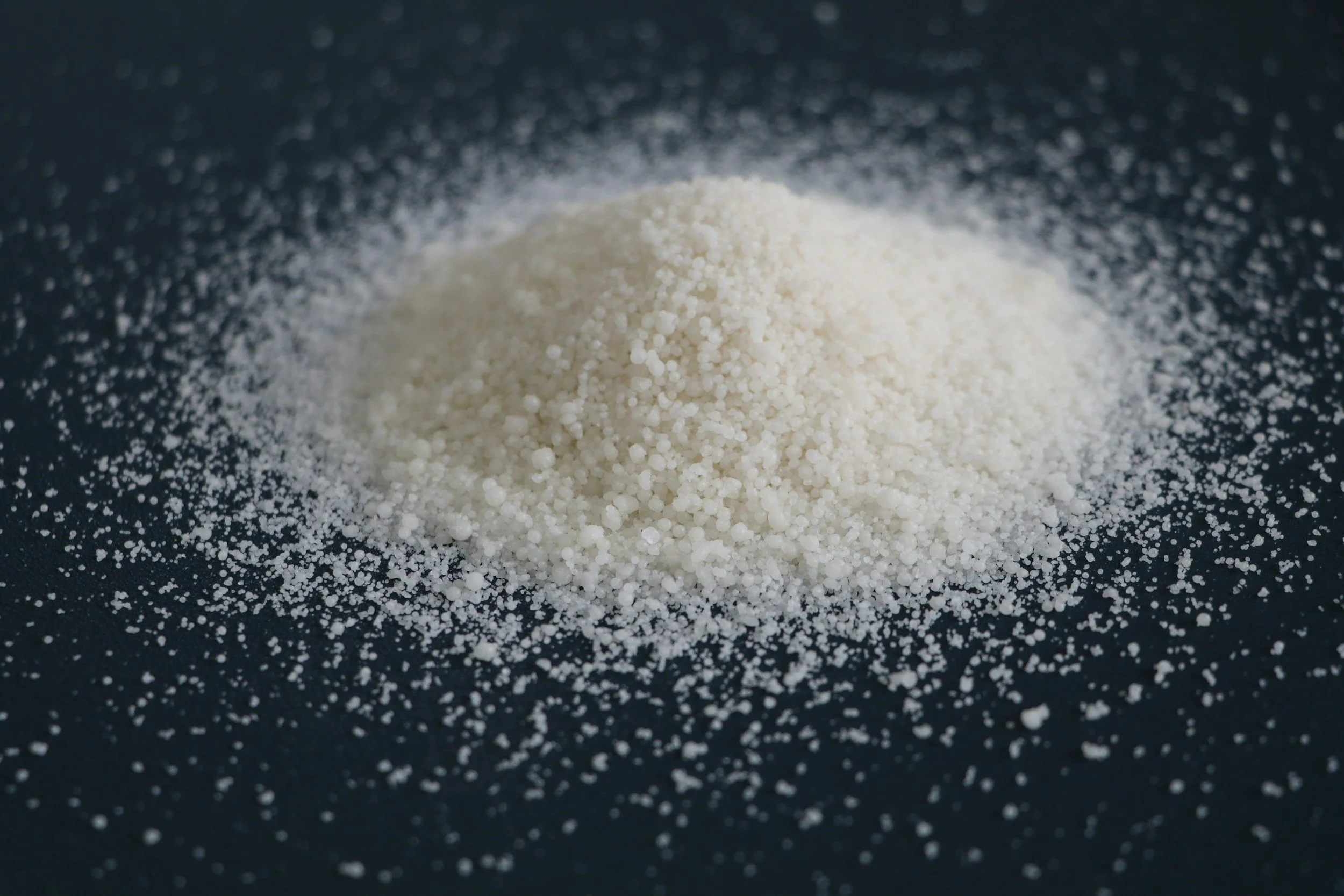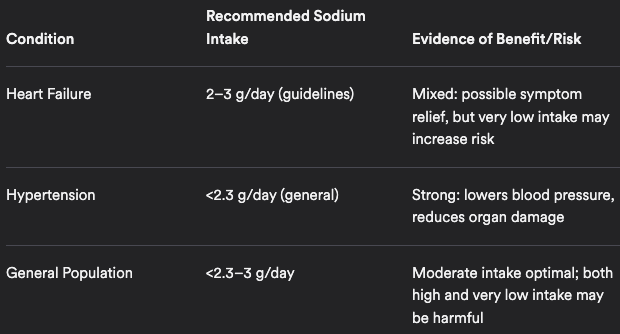Sodium Restrictions and Recommendations for Heart Failure and Hypertension: What does the Science Say?
Sodium intake is a central focus in managing both heart failure and hypertension, but recent research reveals a nuanced picture. Here’s what patients and healthcare clinicians need to know about sodium restriction, its benefits, and its potential risks.
Why Sodium Matters
Consistent excess sodium has been linked in the research as a key contributor to high blood pressure in some individuals and to heart failure risk. Reducing daily sodium intake may lead to lower blood pressure and can help prevent the development of hypertension and related cardiovascular complications [1] [2] [3]. For those already diagnosed with heart failure or hypertension, sodium restriction is a common recommendation, but the optimal level and impact on outcomes are still widely debated [3] [4] [5] [6].
Sodium Restriction in Heart Failure
Guideline Recommendations: Most professional clinical guidelines recommend sodium restrictions for heart failure patients, but the recommended ranges can vary significantly by association. The majority of recent guideline recommendations continue to suggest 2–3 grams per day for those with chronic heart failure with active symptoms of congestion and 3-5 grams per day for those medically managed without symptoms, with stricter limits (<2 grams) for more severe/acute/hospitalized cases [3] [4] [11].
Evidence and Controversy: Clinical studies examining the impact of sodium intake on heart failure remain limited and inconsistent. While some studies and reviews suggest sodium restriction may reduce symptoms and hospitalizations, others show no benefit—or even potential harm, such as increased mortality, decreased quality of life, increased psychological distress, and increased frequency of hospitalizations with very low sodium intake. It is important to note that some of the research on sodium restriction is confounded with participants often receiving co-therapy (RAAS inhibitors, beta-blockers, loop diuretics, mineralocorticoid receptor antagonists, etc), small subject sizes and population diversity, and low statistical power [3] [4] [5] [6] [7] [8] [11].
Individualization is Key: Based on the most recent clinical guidelines, recommendations, and meta-analyses, the best approach appears to point towards avoiding both excessive sodium intake and overly aggressive sodium restriction with tailoring recommendations to the individual’s symptoms, heart failure severity, and comorbidities. Identifying current daily or average weekly sodium intake and working towards reduction to within recommended ranges may greater support individual’s success in achieving and following a lower sodium dietary pattern for cardiovascular disease. [3] [4] [9] [11].
Sodium Restriction in Hypertension
Strong Evidence for Benefit: Lowering sodium intake has shown to reduce blood pressure in those with elevated blood pressure vitals and lower the risk of hypertension-related organ damage over the long-term [1] [2] [3].
Recommended Intake: Several large cardiology associations have reduced or removed their sodium intake recommendations for the cardiovascular disease population as further research appears necessary for population-wide recommendations. Some institutions, such as the American Heart Association and USDA/HHS’s 2020-2025 Dietary Guidelines for Americans, continues to advise a daily sodium intake at or below 2,300 mg (about 1 teaspoon of salt) for the general population, with even lower targets (</= 1,500 mg) for those with hypertension or at high risk for development [2] [3] [4].
Sodium Intake Recommendations and Outcomes
FIGURE 1. Sodium recommendations and evidence for heart failure and hypertension [1] [2] [3] [4] [5] [6] [8]
Practical Tips and Challenges
Adherence is Difficult: Most individuals world-wide consume more sodium than recommended, and compliance is a major challenge. With most prepackaged, processed, and frozen or canned meals containing a considerable amount of sodium per serving, it can be daunting to try to maintain adequate nutrition while reducing sodium. Additionally, it can take time for your taste buds and body to adjust to a lower sodium dietary intake, so cutting out sodium cold-turkey is consistent with a high risk of relapse or loss of continuation of habit. Personalized nutrition education, use of herbs/spices, and avoiding high intake of processed foods can significantly improve ability to keep sodium intake within recommended limits [10].
Progress Over Perfection: Initiating a sodium restriction should be individualized and clinically guided, especially in heart failure, to avoid unintended harm from excessive sodium or nutritional restriction. Focus on gradual, intentional, and meaningful changes day-by-day or week-by-week to improve adherence, quality of life, and chances of success [3] [4] [9].
Conclusion
Sodium restriction remains a cornerstone of hypertension management and is widely recommended for heart failure, but the ideal level is still heavily debated and further research is required to elucidate more accurate recommendations. Moderate restriction is generally safe and beneficial, while both excessive sodium and overly strict restriction may be harmful—especially in heart failure. Always consult with a knowledgeable healthcare provider, such as a Cardiologist or Registered Dietitian Nutritionist, to tailor sodium recommendations to your individual needs.
At Wholehearted Nutrition and Wellness PLLC, we strongly believe that food is more than just fuel. It’s medicine, connection, enjoyment, and empowerment. We recognize why nutrition deserves center stage in cardiovascular disease management. If you’re interested in starting a heart healthy dietary pattern or learning how to manage your heart disease through nutrition, book an appointment with us today and begin your journey to better heart health.
References
1. Yuan, M., Yan, D., Wang, Y., Qi, M., Li, K., Lv, Z., Gao, D., & Ning, N. Sodium intake and the risk of heart failure and hypertension: epidemiological and Mendelian randomization analysis. Frontiers in Nutrition. 2024; 10. https://doi.org/10.3389/fnut.2023.1263554
2. Nista, F., Gatto, F., Albertelli, M., & Musso, N. Sodium Intake and Target Organ Damage in Hypertension—An Update about the Role of a Real Villain. International Journal of Environmental Research and Public Health. 2020; 17. https://doi.org/10.3390/ijerph17082811
3. Hogas, M., Stătescu, C., Pădurariu, M., Ciobîcă, A., Bilha, S., Hăisan, A., Timofte, D., & Hogas, S. Salt, Not Always a Cardiovascular Enemy? A Mini-Review and Modern Perspective. Medicina. 2022; 58. https://doi.org/10.3390/medicina58091175
4. Patel, Y., & Joseph, J. Sodium Intake and Heart Failure. International Journal of Molecular Sciences. 2020; 21. https://doi.org/10.3390/ijms21249474
5. Khan, M., Jones, D., & Butler, J. Salt, No Salt or Less Salt For Heart Failure Patients?. The American journal of medicine. 2020 https://doi.org/10.1016/j.amjmed.2019.07.034
6. DiNicolantonio, J., Chatterjee, S., & O’Keefe, J. Dietary Salt Restriction in Heart Failure: Where Is the Evidence?. Progress in cardiovascular diseases. 2016; 58 4. https://doi.org/10.1016/j.pcad.2015.12.002
7. Doukky, R., Avery, E., Mangla, A., Collado, F., Ibrahim, Z., Poulin, M., Richardson, D., & Powell, L. Impact of Dietary Sodium Restriction on Heart Failure Outcomes.. JACC. Heart failure. 2016; 4 1. https://doi.org/10.1016/j.jchf.2015.08.007
8. Siddiqi, T., Usman, M., Siddiqi, A., Rashid, A., Kamimura, D., Shafi, T., Testani, J., Pandey, A., Mentz, R., Butler, J., & Hall, M. Abstract 15681: Impact of Dietary Sodium Restriction on Heart Failure Outcomes: A Systematic Review and Meta-Analysis. Circulation. 2022 https://doi.org/10.1161/circ.146.suppl_1.15681
9. Konerman, M., & Hummel, S. Sodium Restriction in Heart Failure: Benefit or Harm?. Current Treatment Options in Cardiovascular Medicine. 2014; 16. https://doi.org/10.1007/s11936-013-0286-x
10. Azandjeme, C., Sossa, C., Hounkponou, M., Ahanhanzo-Glèlè, Y., Sodabi, B., Mizehoun, C., Darboux, A., & Houénassi, M. Factors associated with noncompliance of sodium restriction in hypertensive and heart failure patients at the National Hospital of Cotonou, Benin. Journal of Public Health in Africa. 2020; 11. https://doi.org/10.4081/jphia.2020.1303
11. Mullens, W., Damman, K., Dhont, S., Banerjee, D., Bayes-Genis, A., Cannata, A., Chioncel, O., Cikes, M., Ezekowitz, J., Flammer, A.J., Martens, P., Mebazaa, A., Mentz, R.J., Miró, Ò., Moura, B., Nunez, J., Ter Maaten, J.M., Testani, J., van Kimmenade, R., Verbrugge, F.H., Metra, M., Rosano, G.M.C. and Filippatos, G. (2024), Dietary sodium and fluid intake in heart failure. A clinical consensus statement of the Heart Failure Association of the ESC. Eur J Heart Fail, 26: 730-741. https://doi.org/10.1002/ejhf.3244



